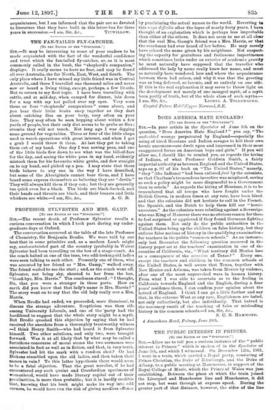PROFESSOR SYLVESTER AND MRS. GAMP.
[TO THE EDITOR OF THE "SPECTATOR"]
Si,—The recent death of Professor Sylvester recalls a curious conversation in which I took part during my under- graduate days at Oxford.
The conversation occurred at the table of the late Professor of Chemistry, Sir Benjamin Brodie. We were told by our host that in some primitive and, as a modern Lamb might say, unsteamtainted part of the country (probably in Wales) Sylvester had been travelling on the box of a stage-coach. As the coach halted at one of the inns, two odd-looking old ladies were seen talking to each other. Presently one of them, who was accosted by her friend as "Mrs. Gamp," walked away. The friend waited to see the start ; and, as the coach went off, Sylvester, not being shy, shouted to her from the box, ." Good-bye, Mrs. Harris." The coachman stared : "I thought, Sir, that you were a stranger in these parts. How on earth did you know that that lady's name is Mrs. Harris ? " The story went on to say that the old lady really was a Mrs. Harris.
When Brodie bad ended, we proceeded, more Oxoniensi, to discuss the strange adventure. Scepticism was then rife among University Liberals, and one of the 'party had the hardihood to suggest that the whole story might be a myth. But Brodie quashed this objection by saying that he had received the anecdote from a thoroughly trustworthy witness —I think Henry Smith—who had heard it from Sylvester himself. Two other solutions, and only two, were brought forward. Was it at all likely that by what may be called a fortuitous concourse of moral atoms the two surnames were associated in fact as well as in fiction, and that, in very truth, Sylvester had hit the mark with a random shot ? Or had Dickens stumbled upon the old ladies, and then taken their names in vain ? To this latter hypothesis there would seem to be a fatal objection. That the great novelist, if he had encountered any such quaint and Cranfordian specimens of womanhood, would have made literary capital oat of their peculiarities, is more than probable; but it is hardly credible that, knowing that his book might make its way into odd corners, he would have run the risk of giving needless offence by proclaiming the actual names to the world. Reverting to this nuga chfficilis after the lapse of nearly forty years, I have thought of an explanation which is perhaps less improbable than either of the others. It does not seem to me at all clear that the real Mrs. Gamp's friend was a Mrs. Harris, or that the coachman had ever heard of her before. He may merely have echoed the name given by his neighbour. Not suspect. ing the capacity for gratuitous and frolicsome impertinence which sometimes lurks under an exterior of academic gravity he must naturally have supposed that the traveller who addressed the lady by name really knew her name, and must as naturally have wondered how and where the acquaintance between them had arisen, and why it was that the greeting was so long deferred, so laconic, and so entirely on one side. If this is the real explanation it may serve to throw light on the development not merely of one mongrel myth, of a myth born partly of truth, but of the whole class of such myths.—


































 Previous page
Previous page